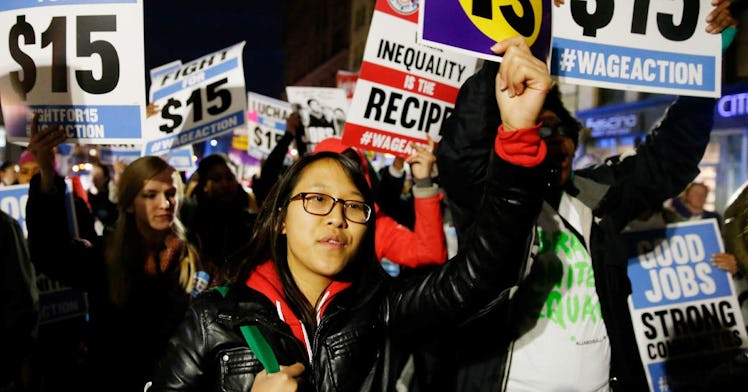Study Shows Raising Minimum Wage Will Lower Infant Mortality Rate
We should not delay raising the minimum wage.

A new study from professors at Syracuse University has found that raising the minimum wage can significantly reduce infant mortality in large cities across the United States.
The change is so significant that, actually, the study suggests that each time the minimum wage raises by just a dollar (keep in mind the federal minimum wage is currently $7.25/hour), the infant mortality rate drops by 1.8 percent annually in big cities. That jump in the survivability rates of infants is extremely significant.
It appears to mean that if a jump of, say, $8 to the minimum wage, up to around $15/hour were to happen (as Senate Democrats have put forward raising the minimum wage to that rate by 2025) that the infant mortality rate would drop significantly and could save thousands of infant lives from preventable deaths.
In this study, cities were designated as metropolitan areas that have more than 250,000 residents. The researchers relied on previous studies that have consistently shown that raising the minimum wage reduces rates of teenage pregnancy, premature birth, financial stress, access to health care during pregnancy, smoking during pregnancy, infants being born at low-weights, and infant deaths.
Indeed, raising the minimum wage is just a sheer quality of life increase for many struggling American families, some of whom operate at subminimum wages or work several jobs in order to pay rent and keep food on the table.
Increasing the minimum wage to $15/hour would lift 33 million low-wage workers’ wages and millions out of poverty as they continue to perform essential duties like working at grocery stores, on the food supply chain, at restaurants, and more.
But — while the news is good — the study also has some dark implications. Namely, that state efforts to stop localities from raising their minimum wages have been correlated to the deaths of babies.
They state that in some 25 states that have stopped localities from setting a higher minimum wage than that of the state, more than 600 infant lives could have been saved if the cities were allowed to raise their minimum wage to just $9.99/hour. The effects of raising minimum wages are compounded as the wage goes higher: some 1,400 infant lives could have been saved if cities could have raised the wage to $15/hour already, as well.
Pre-emption laws, as they are called, are laws that states pass to prohibit cities from creating their own laws about guns, paid leave, and wages, for example, appear to be a major problem in improving the quality of people’s lives. In fact, some laws that stopped cities from passing their own minimum wage increases were enacted after the cities tried to do so.
In any case, the 25 states that have pre-emptive laws regarding wages have made a massive consequence in the lives of millions of American works. According to the study, 2.6 million workers make below, or the federal minimum wage — which is, again, $7.25/hour, and 20.6 million workers make “near minimum wage.” Those 20.6 million workers, for the record, make up 30% of the hourly workforce.
The research is clear. Higher wages save lives and help families thrive. When thought about in these terms, the matter of raising the minimum wage becomes all the more urgent — and doesn’t feel like something that can wait four more years.